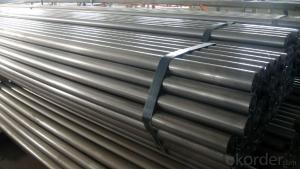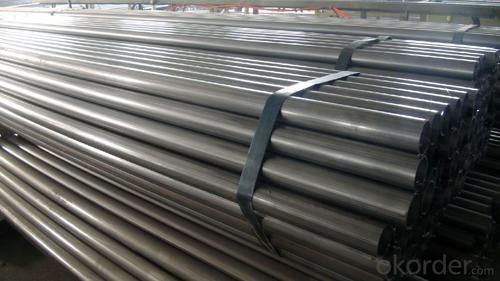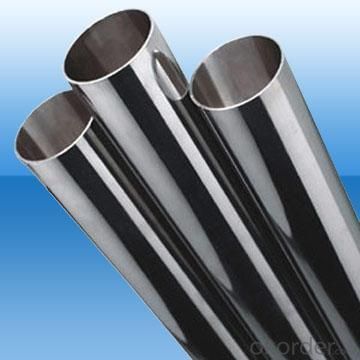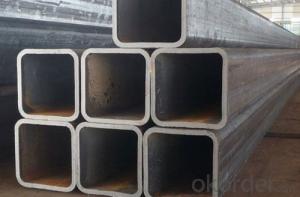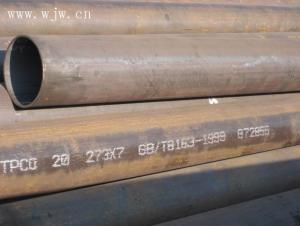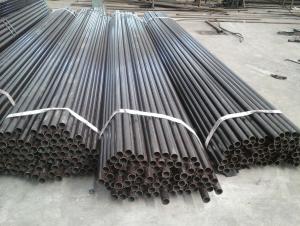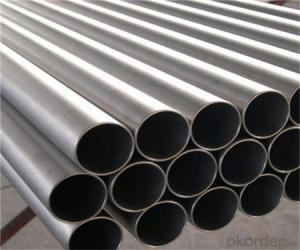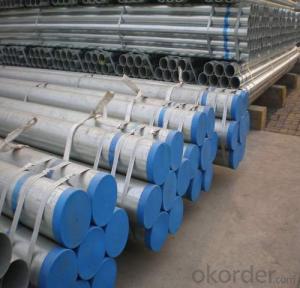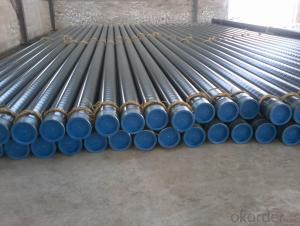Thin Wall Carbon Steel Seamless Pipe Manufacturers
- Loading Port:
- Tianjin
- Payment Terms:
- TT OR LC
- Min Order Qty:
- 35 m.t
- Supply Capability:
- 5000 m.t/month
OKorder Service Pledge
OKorder Financial Service
You Might Also Like
Specification
Structure :
Seamless pipe is formed by drawing a solid billet over a piercing rod to create the hollow shell. As the manufacturing process does not include any welding, seamless pipes are perceived to be stronger and more reliable. Historically seamless pipe was regarded as withstanding pressure better than other types, and was often more easily available than welded pipe.
Main Features :
• High manufacturing accuracy
• High strength
• Small inertia resistance
• Strong heat dissipation ability
• Good visual effect
• Reasonable price
Specification:
1) Material:20#(ASTM A 106/A53 GRB.API5LGRB,GB),45#,16Mn,10#.
2) Specification range:OD:21.3-610mm,WT:6-70mm,length:6-12m or according to the requirement of clients.
3) Excutive standards:GB,ASME API5L.ASTM A 106/A53,Despite of the above standards,we can also supply seamless steel pipe with standard of DIN,JIS,and so on,and also develop new products according to the requirements of our clients!
4) Surface:black lacquered,varnish coating or galvanized.
5) Ends:Beveled or square cut,plastic capped,painted.
6) Packing:bundles wrapped with strong steel strip,seaworthy packing.
FAQ :
A. How is the quality of your products?
Our products are manufactured strictly according to national and internaional standard, and we take a test on every pipe before delivered out. If you want see our quality certifications and all kinds of testing report, please just ask us for it.
Guaranteed: If products’ quality don’t accord to discription as we give or the promise before you place order, we promise 100% refund.
B. How about price?
Yes, we are factory and be able to give you lowest price below market one, and we have a policy that “ for saving time and absolutely honest business attitude, we quote as lowest as possible for any customer, and discount can be given according to quantity”,if you like bargain and factory price is not low enough as you think, just don’t waste your time.Please trust the quotation we would give you, it is professional one.
C.Why should you chose us?
Chose happens because of quality, then price, We can give you both.Additionally, we can also offer professional products inquiry, products knowledge train(for agents), smooth goods delivery, exellent customer solution proposals.Our service formula: good quality+good price+good service=customer’s trust
SGS test is available, customer inspection before shipping is welcome, third party inspection is no problem.
Any question, pls feel free to contact us !
Product image:
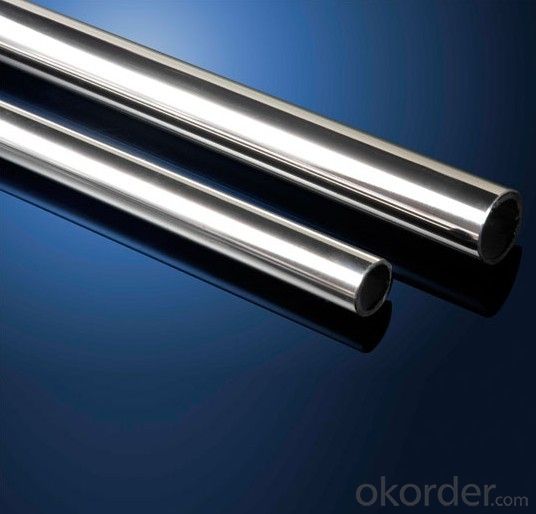
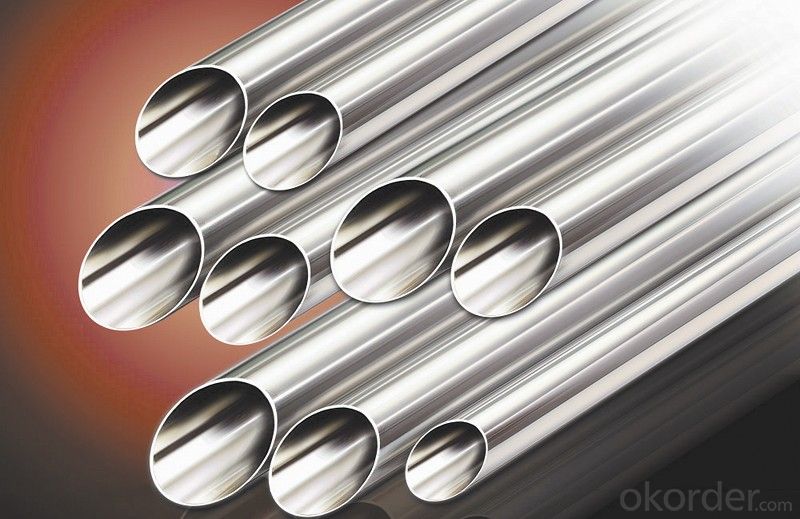
Company Information:
Since 2004, the trading volume of CNBM International has been doubled in 5 successive years owing to the support of superior corporations and effort of all staff. Meanwhile, we have established strategic partnerships with hundreds of domestic manufacturers and sound business relations with clients from over 120 countries. Currently, we have wholly-owned overseas subsidiaries and branches in 5 countries with a view to realize localization, which also represents an essential progress in our globalization target.
In line with the business, CNBM International launched E-business platform Okorder.com.Our goal is to transform CNBM International into the global leading brand in building materials industry within 3 to 5 years through innovation and reform, by strengthening the overall management of supply chain, developing and cultivating both domestic and overseas market, improving the procedure and information system, enhancing the ability to organize resources and to provide value-added services under a professional team and a learning organization.
- Q: What does seamless steel tube mean? What are the main uses? What are the classifications?
- Electrical, gas, water, power, fluid, pipe.The main production process for hot rolling seamless steel tube (the main inspection):Tube preparation and check delta to billet heating, heating, rolling, perforated pipe, steel pipe and heat treatment, diameter (minus) Delta to finished tube straightening, finishing and inspection of delta (nondestructive, physicochemical, Taiwan inspection and warehousing)Main production process of cold rolled (drawn) seamless steel tube:Blank preparation, pickling, lubrication, cold rolling (drawing), heat treatment, straightening, finishing and inspection
- Q: How are steel pipes used in the telecommunications network infrastructure?
- Steel pipes are widely used in the telecommunications network infrastructure for various purposes. One of the primary uses of steel pipes in this industry is for the installation of underground cable conduits. These conduits protect the telecommunications cables from external factors such as moisture, rodents, and physical damage. Steel pipes provide excellent strength and durability, ensuring the long-term protection of the cables. Additionally, steel pipes are used in the construction of telecom towers and antenna masts. These structures need to be sturdy and able to withstand harsh weather conditions. Steel pipes offer the necessary strength, stability, and resilience required for telecom towers to support antennas and other equipment. They can be easily assembled, allowing for efficient deployment and maintenance of the network infrastructure. Moreover, steel pipes are essential for the installation of fiber optic cables. Fiber optic cables transmit data at high speeds using light signals. To ensure optimal performance, these cables need to be protected from any external interference. Steel pipes serve as a conduit for fiber optic cables, shielding them from electromagnetic interference and other potential disruptions. In summary, steel pipes play a crucial role in the telecommunications network infrastructure. They are used for the installation of underground cable conduits, construction of telecom towers, and protection of fiber optic cables. The strength, durability, and versatility of steel pipes make them an ideal choice for ensuring the reliability and functionality of telecommunications systems.
- Q: How are steel pipes used in the construction of chemical plants?
- Steel pipes are commonly used in the construction of chemical plants for various purposes. They are primarily utilized for transporting fluids and gases, such as chemicals, water, and steam, throughout the facility. These pipes are selected for their durability, strength, and resistance to corrosion, which is crucial in an environment where exposure to harsh chemicals is common. Steel pipes are also used for structural support, such as in the construction of platforms, walkways, and pipe racks. Additionally, they can be employed for ventilation and exhaust systems, as well as for fire protection systems in chemical plants. Overall, steel pipes play a vital role in ensuring the safe and efficient operation of chemical plants.
- Q: Are steel pipes resistant to vibration?
- Yes, steel pipes are generally resistant to vibration due to their inherent strength and rigidity. However, the level of resistance can vary depending on factors such as pipe thickness, design, and installation. Additionally, the presence of external factors like fluid flow or mechanical forces can also affect the level of vibration resistance.
- Q: How are steel pipes used in the manufacturing of storage tanks?
- Steel pipes are commonly used in the manufacturing of storage tanks as they provide structural strength and durability. These pipes are used to create the framework or skeleton of the tank, providing support and stability to hold large volumes of liquid or gas. Additionally, steel pipes are often used for the inlet and outlet connections, as well as for internal piping systems that allow for the transportation of substances within the tank. Overall, steel pipes play a crucial role in ensuring the integrity and functionality of storage tanks in various industries.
- Q: How do you join steel pipes together?
- Steel pipes can be joined together using various methods, including welding, threaded connections, flanges, and mechanical couplings. The most common method is welding, where the ends of the pipes are heated and fused together using a welding electrode. Threaded connections involve screwing the pipes together using male and female threads. Flanges are used for larger pipes and involve bolting two flanges together with a gasket in between. Mechanical couplings use compression or clamping mechanisms to connect pipes without the need for welding or threading.
- Q: How do steel pipes withstand high pressure and temperature?
- Steel pipes are designed to withstand high pressure and temperature due to their inherent strength and durability. The composition of steel, with its high tensile strength and resistance to deformation, allows it to maintain its structural integrity even under extreme conditions. Additionally, steel pipes are often manufactured with thicker walls and reinforcement techniques to further enhance their ability to withstand pressure and temperature.
- Q: Are metal spiral tubes the same as metal bellows?
- The corrugated pipe is extruded by the extruder, the winding pipe is wound in a circle, and the prestressed metal corrugated pipe is a reserved channel.
- Q: How are steel pipes used in the manufacturing of desalination plants?
- Steel pipes are used in the manufacturing of desalination plants for various purposes, such as transporting seawater, brine, and freshwater through different stages of the desalination process. They are also used for the construction of pipelines, intake systems, and discharge outlets, ensuring durability, corrosion resistance, and efficient water flow in these critical systems.
- Q: What are the different methods of insulating steel pipes?
- There are several methods of insulating steel pipes, including using insulation wraps, foam insulation, fiberglass insulation, and pre-insulated pipe systems. Insulation wraps are typically made of materials like rubber or polyethylene and are wrapped around the pipe to provide thermal insulation. Foam insulation involves applying a layer of foam insulation directly onto the surface of the pipe. Fiberglass insulation is another common method, where fiberglass material is wrapped around the pipe to provide insulation. Pre-insulated pipe systems are complete pipe systems that come with built-in insulation and are ready to be installed. These methods help prevent heat loss or gain in the pipes, maintain temperature control, and prevent condensation.
Send your message to us
Thin Wall Carbon Steel Seamless Pipe Manufacturers
- Loading Port:
- Tianjin
- Payment Terms:
- TT OR LC
- Min Order Qty:
- 35 m.t
- Supply Capability:
- 5000 m.t/month
OKorder Service Pledge
OKorder Financial Service
Similar products
Hot products
Hot Searches
Related keywords
